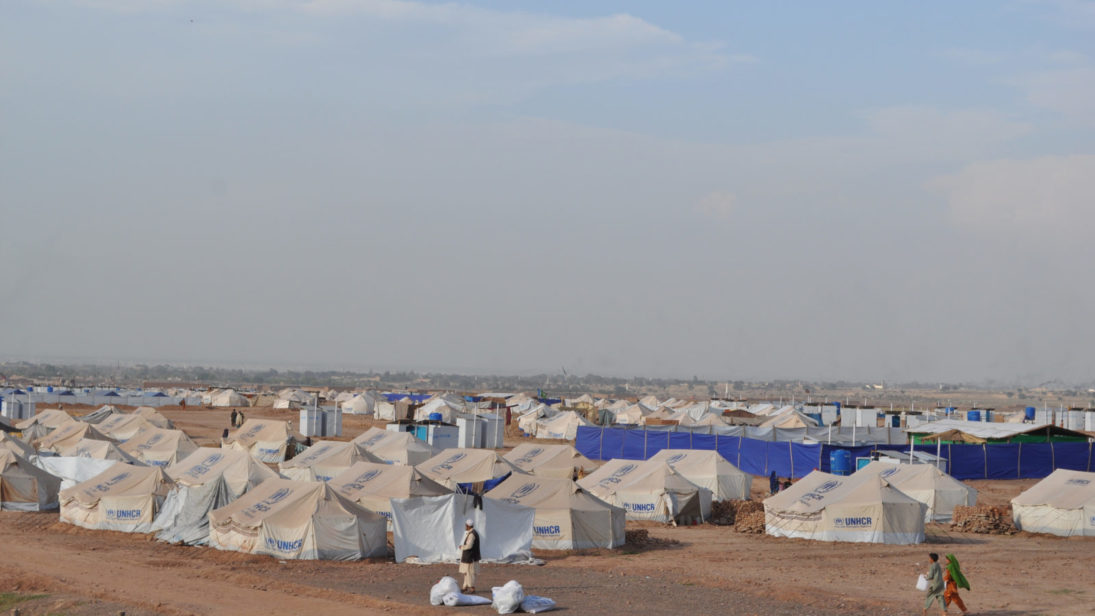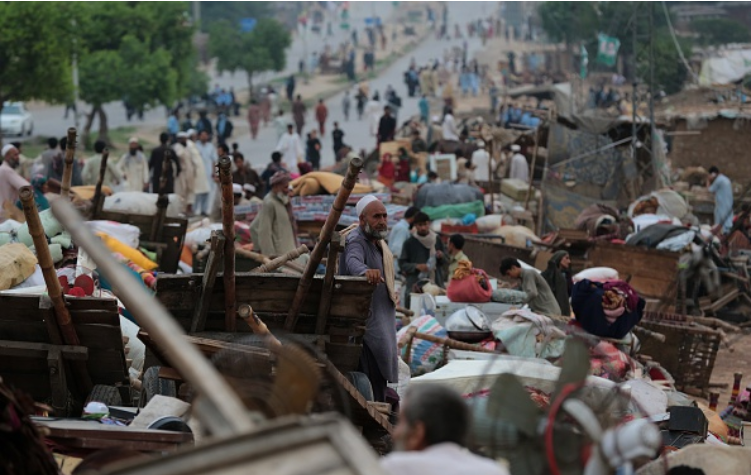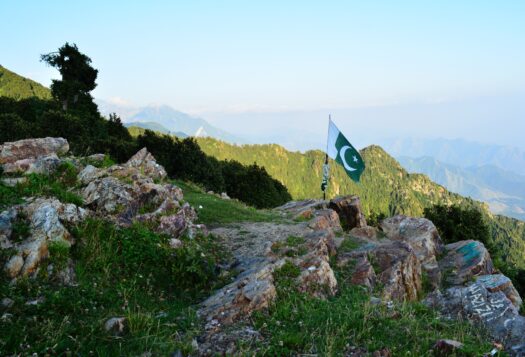
In the aftermath of the September 11 terrorist attacks and the U.S. invasion of Afghanistan, thousands of Afghans fled their country by crossing the border into Pakistani territory. In doing so, they joined the more than 2 million Afghan refugees already residing in Pakistan who left their homeland after the Soviet invasion of Afghanistan in 1979 and the civil unrest after the Soviet withdrawal in 1989. Since 2001, in part due to the porous border between the two countries, the migration of refugees from Afghanistan into Pakistan has remained an unwelcome reality for Pakistan. As of 2016, the country hosts the third largest population of refugees in the world.
While managing the refugee crisis, Pakistan has also paid a heavy toll in the war against terrorism. The State Bank of Pakistan estimated in 2016 that the war on terrorism had cost Pakistan an estimated $118 billion. Pakistan has also lost 21,998 civilians and 6,863 security personnel to terrorist violence from 2003 to 2017. Roughly 33,833 terrorists or insurgents have been reportedly killed in the same time period. Combined with the responsibility of hosting Afghan refugees and mounting a counter-terrorism campaign, Pakistan has also faced the spillover effects of instability from Afghanistan.
As such, since last year Pakistan has initiated a renewed push for the voluntary repatriation of Afghan refugees due to national security concerns. These concerns stem from the impression that refugee camps have become “safe havens” for terrorists and drug smugglers, an assertion articulated by Sartoj Aziz, an advisor to former Prime Minister Nawaz Sharif, last year. Speaking in 2016, then Pakistani Defense Minister Khwaja Asif stated that “… terrorists were slipping into Pakistan disguised as Afghan refugees.” More recently, Asif stated that Afghan refugees in Pakistan needed to be sent home.
This context demonstrates that the presence of undocumented refugees in Pakistan is a major reason behind Islamabad’s demand that Kabul, as well as the international community, ensure the immediate repatriation of Afghan refugees displaced in Pakistan. As such, in asking for Pakistan’s cooperation with regards to Afghan reconciliation and counter-terrorism, Afghan and international interlocutors should take into account Pakistan’s national security concerns related to Afghan refugees.
The repatriation conundrum
International critics, particularly from human rights organizations, have criticized what they call Pakistan’s policy of “mass forced return” of Afghan refugees. However, evidence over the past three years has shown that some Afghan refugees have acted as facilitators or perpetrators of terrorist attacks in Pakistan and that refugees camps have provided safe havens for these individuals. In an infamous December 2014 terrorist attack on the Army Public School in Peshawar, two Afghans were among the seven militants who perpetrated the attack that killed 141 people, many of them children. In early 2017 in response to terrorist attacks inLahore and Peshawar, Pakistan’s Interior Minister, Chaudhry Nisar Ali Khan, stated that “Afghan refugees are used as facilitators in most cases of terrorist attacks.”

While the acts of a few terrorists should not lead to discrimination against Afghan refugees as a whole, these incidents do provide a basis for the government’s decision to enhance border security, stringently monitor the issuing of identity documents, register SIM cards, and implement immigration laws. Indeed, in the past three years, the Pakistan government has taken action against illegal mobile SIM cards and national identity cards.
When it comes to repatriation, however, there are concerns as to how far the Pakistani government should go and how repatriation should be conducted. As of August 2017, there are an estimated 1.4 million registered Afghan refugees in Pakistan. Apart from this figure, a further 600,000 undocumented Afghan refugees also live in Pakistan.
From the perspective of refugees, there have been reports of abuse in the midst of Pakistan’s repatriation effort. Moreover, some refugees have spent the majority, if not all, of their lives in Pakistan. However, national security concerns have forced the Pakistani government to make a difficult choice. When terrorist organizations like Tehrik-i-Taliban Pakistan (TTP) and Tehreek-e-Nafaz-e-Shariat-e-Mohammadi (TNSM) find operational space in areas with high refugee concentrations, suitable actions must be taken.
Outlining a comprehensive policy
In order to find an Afghan refugee policy that respects basic human rights while protecting Pakistan’s national security, a comprehensive policy is required. A comprehensive policy towards Afghan refugees should include a campaign to account for undocumented Afghans, a tolerant approach towards law abiding refugees, and improvements to border management to halt illegal crossings into Pakistan. Likewise, the Pakistan government should reaffirm efforts to secure monetary compensation and assistance for refugees who return to Afghanistan from the international community.
However, implementing such a new approach will require the support of the international community and the government in Afghanistan. The repatriation process should be conducted in a manner that does not hamper Pakistan’s relations with Afghanistan. Pakistan should avoid generalizing and stereotyping all refugees as criminals. Pakistan hosted these refugees for more than a decade despite its own struggling economy and security issues, but national security concerns demand that this population prepare to return to their country with dignity.
***
Editor’s Note: Click here to read this article in Urdu
Image 1: Oxfam International via Flickr.
Image 2: Metin Aktas via Getty Images.


